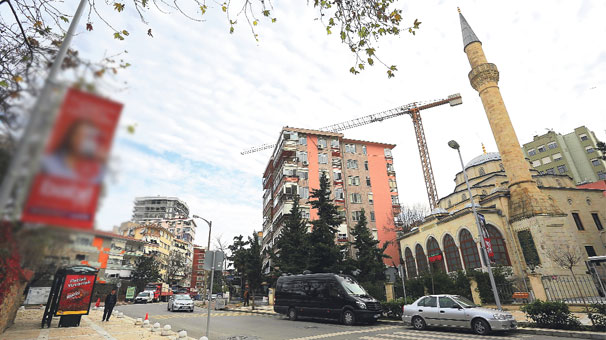Mülk iadesinde emsal karar


Milliyet’ten Kemal Göktaş’ın haberine göre, Yunan uyruklu azınlık mensuplarının mülk edinmelerine sınırlama getiren 1964 tarihli kararname ile el konulan Fenerbahçe Camii'nin bulunduğu arazinin, halen Yunanistan'da yaşayan 92 yaşındaki Stamatis Papamanolaki adına tescil edilmesi kararını onadı. Eski Ekümenik Patrik Maksimos Vapurci'nin mirasçılarından olan Papamanolaki'nin hukuk zaferi, söz konusu kararname ile Hazine'ye devredilen diğer mülklerin iadesinin de önünü açtı. Papamanolaki'nin ise arazideki caminin varlığına razı olacağını, sadece arazinin maddi değerini Hazine'den talep edeceği belirtildi.
Ernestuğ Vapurci, 1949 yılında Vatan Kümiziyan isimli kişiden Kadıköy Zühtüpaşa Mahallesi’nde bir köşk aldı. Erenstuğ Vapurci 1971’de ölünce köşk, daha sonra Fener Patriği olacak olan kardeşi Maksimos Vapurci ve diğer kardeşi Yani Vapurci’ye geçti. Maksimos Vapurci 1972’de öldü. Köşkün tek sahibi Yani Vapurci de 1974’de öldü. Çocuğu olmadığı için köşk, eşi Kornilla Vapurci’ye kaldı. Kornilla Vapurci, mahkemeden mirasçılık belgesi aldı. Kornille Vapurci de 1982 yılında düzenlediği vasiyetname ile köşkü ve üzerinde bulunduğu araziyi evlatlığı Yunan asıllı Türk vatandaşı Stamatis Papamanolaki’ye bıraktı.
Hazine köşke el koydu
Hazine, mahkemeye başvurarak 1964 Kararnamesi’ne göre, Kornilia’nın mirasçılık belgesinin iptalini istedi.. Kadıköy 3. Sulh Hukuk Mahkemesi, Hazine’nin talebini yerinde görerek 1985’de mirasçılık belgesini iptal etti. Köşk ve üzerinde kurulu arazi devletin eline geçti. Dava sürerken, Vapurci de hayatını kaybetti, köşkü evlatlığı olan Stamatis Papamanolaki’ye bıraktı. Mahkeme kararından sonra, 1986 yılında köşk yıkıldı. Daha sonra arazi üzerine Fenerbahçe Camii inşa edildi.
Mahkemenin lehte kararı
Papamanolaki, 2008’de Kadıköy 1. Asliye Hukuk Mahkemesi’ne başvurarak köşk ve arazinin kendisine verilmesini istedi. Mahkeme 1964 Bakanlar Kurulu Kararnamesine göre, sadece Yunan uyruklu kişilerin Türkiye’deki malları üzerinde her türlü hakkın yasaklanmış olmasının hukuka uygun olmadığını vurguladı. Kararda, 1964 kararnamesi ile Yunan uyruklu kişilere ait taşınmazlara getirilen devir yasağının geçici bir tedbir olarak anlaşılması gerektiği, mülkiyet hakkını tamamen ortadan kaldırmayacağı ifade edildi. Mahkeme bu gerekçeyle Hazine adına olan tapu kaydının iptaline ve tapunun davacı adına tesciline karar verdi. Ancak Yargıtay 3. Hukuk Dairesi yerel mahkemenin kararını bozdu. Dairenin kararında, 1964 yılında çıkırılan kararname ile taşınmazın Hazine’ye geçtiği, dolayısıyla, davacının kendi adına tapu tescili istemesine dayanak olan vasiyetnamenin vasiyetçisi konumunda olan Kornelia Vapurci’nin taşınmaz yönünden Yani Vapurci’nin mirasçısı olmadığının mahkeme kararıyla saptanmış olduğu savunuldu.
"Mütekabiliyet var mı?"
Dosyanın gönderildiği yerel mahkeme ise kararında direndi. Mahkeme kararında, kararnamenin 1964 tarihli kararnamenin Yunanistan uyruklu kişilerin taşınmazlarının devrine ilişkin geçici önlemler içerdiği vurgulandı ve bu kararnamenin 1988’de çıkarılan başka bir Bakanlar Kurulu kararnamesi ile yürürlükten kaldırıldığı dikkat çekildi. Mahkemenin direnme kararı üzerine dosya Yargıtay Hukuk Genel Kurulu’na geldi. Kurul, yerel mahkemenin 1964 kararnamesinin hüküm ve sonuçlarına ilişkin görüşünü doğru buldu ancak konunun mütekabiliyet (karşılıklılık) açısından da değerlendirmesi gerekçesiyle mahkeme kararını bozdu. Kurul kararında "karşılıklılık" ilkesi yönünden araştırma yapılmasından sonra, taşınmazın Kornelia tarafından edinilebileceğinin ve bu yolla mal varlığına dahil olduğunun tespiti halinde davanın kabulüne karar verilmesi, aksi durumda ise davanın reddedilmesi" gerektiği belirtildi.
Hazine'nin tapusu iptal
Mahkemenin mütekabiliyet (karşılılık) olup olmadığını sorduğu Adalet Bakanlığı Uluslararası Hukuk ve Dış İlişkiler Genel Müdürlüğü, Dışişleri Bakanlığı ve Tapu Kadastro Genel Müdürlüğü'nden alınan yazılarda Yani Vapurci'nin ölüm tarihi olan 16 Haziran 1974'de Türkiye ve Yunanistan devletleri arasında miras ve gayrimenkul edinimi açısından karşılıklılık bulunduğu belirtildi. Bunun üzerine mahkeme taşınmazın Hazine'ye ait olan tapusunun iptal edilerek Stamatis Papamanolaki adına tescil edilmesine karar verdi.
Fenerbahçe bölgesinde iş yapan gayrimenkul sektöründen uzmanlar ve emlakçıların verdiği bilgiye göre arazinin değeri 12 milyon dolara (yaklaşık 27.9 milyon TL) tekabül ediyor.
"Doğru ve adil karar"
Konuyu Milliyet'e değerlendiren Papamanolaki'nin avukatı Barış Tan, 1964 kararnamesi uyarınca Rumlara ait taşınmazların Hazine adına tesciline yönelik kararların, Yargıtay denetiminden geçerek kesinleşse bile, kesin hüküm niteliğinde olmadığını, dolayısıyla 1988 kararnamesi itibariyle bu taşınmazların mirasçılar tarafından talep edilebileceğine karar verilmesinin oldukça önemli olduğunu belirterek şunları söyledi:
"İşin en zor tarafı bu noktadaydı. Zira Rumların elindeki taşınmazlara Hazinece el konulması, kendilerine veraset belgesi dahi verilmemesi gibi Yargıtay'ın yıllarca vermeye devam ettiği hukukun temel ilke ve kuramları ile bağdaşmayan kararları vardı. 1964 Kararnamesinin getirdiği önlemlerin geçici olduğu gibi, bu kararnameye dayanılarak verilen mahkeme kararlarının dahi geçici nitelikte olduğu belirlendi. Bu gerçekten son derece doğru ve adil bir karardır. Bu karar verilirken, dava konusu yerde bir cami olduğu ve davanın kazanılması halinde arazinin bir gayrimüslime geçeceği tartışma konusu yapılmamıştır. Mahkeme ve Yargıtay, son derece tarafsız ve önyargısız davranmıştır.”


